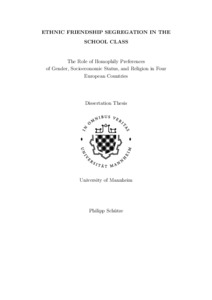|
Ethnic friendship segregation in the school class – The role of homophily preferences of gender, socioeconomic status, and religion in four European countries
Schütze, Philipp
![[img]](https://madoc.bib.uni-mannheim.de/67272/1.hassmallThumbnailVersion/Dissertation_Philipp_Sch%C3%BCtze.pdf)  Vorschau |
|
PDF
Dissertation_Philipp_Schütze.pdf
- Veröffentlichte Version
Download (13MB)
|
|
URN:
|
urn:nbn:de:bsz:180-madoc-672725
|
|
Dokumenttyp:
|
Dissertation
|
|
Erscheinungsjahr:
|
2024
|
|
Ort der Veröffentlichung:
|
Mannheim
|
|
Hochschule:
|
Universität Mannheim
|
|
Gutachter:
|
Helbling, Marc
|
|
Sprache der Veröffentlichung:
|
Englisch
|
|
Einrichtung:
|
Fakultät für Sozialwissenschaften > Sociological Methodology (Gautschi 2009-)
|
|
Fachgebiet:
|
300 Sozialwissenschaften, Soziologie, Anthropologie
|
|
Freie Schlagwörter (Englisch):
|
migration , integration , friendship , social networks , homophily , gender , social-exchange , Muslim
|
|
Abstract:
|
This dissertation explores social integration by studying the evolution of friendships between young migrants and natives in school classes across Germany, the Netherlands, the United Kingdom, and Sweden, utilizing data from the Children of Immigrants Longitudinal Survey in Four European Countries (CILS4EU). It aims to identify the social factors influencing the formation of inter-ethnic and inter-religious friendships, focusing on the boundaries between ethnic groups within school environments. The first study emphasizes the significance of opportunity structure in friendship formation between natives and migrants. Employing ego-level (pooled OLS) and dyad-level (2-step approach on firthlogit and multilevel logit) techniques, it demonstrates that gender availability within ethnic groups plays a crucial role in inter-ethnic friendship formation. Specifically, lower gender availability within one's own ethnic group correlates with an increased probability of cross-group friendships. This highlights the dominance of gender over ethnicity in shaping social segregation among youth in educational environments, underscoring a broader pattern: the pivotal role of opportunity structure “within” social categories. In the second study, grounded in exchange theory, the research explores the role of social exchange in intergroup friendships between native and migrant adolescents. Utilizing ego-level (OLS) and dyad-level (multi-level logit) analyses, the study investigates the interplay between parental socioeconomic status (SES) and immigrant status in friendship formation. While rising relative SES among migrants fosters greater inter-group friendships, the analysis also reveals a nuanced mixture of status exchange and status similarity preferences, with the latter exerting a stronger influence. These findings underscore the significance of examining the interplay between status exchange and status similarity preferences in shaping the formation of inter-ethnic friendships among adolescents. The third study examines the integration of Muslim migrants in Western societies, with a focus on how attitudes toward sexual liberalization influence friendship dynamics within school environments. By employing multilevel exponential random graph models (MLERGMs), the study reveals that attitudes toward sexual liberalization play a mediating role in Muslim segregation. Specifically, when controlling for attitude homophily, the study reveals a reduction in the tendency of Muslim migrants to form friendships within their religious denomination. However, despite this mediation effect, a significant portion of religious segregation remains unexplained, emphasizing the need for future research to delve deeper into the underlying factors shaping Muslim friendship segregation.
|
 | Dieser Eintrag ist Teil der Universitätsbibliographie. |
 | Das Dokument wird vom Publikationsserver der Universitätsbibliothek Mannheim bereitgestellt. |
 Suche Autoren in Suche Autoren in
Sie haben einen Fehler gefunden? Teilen Sie uns Ihren Korrekturwunsch bitte hier mit: E-Mail
Actions (login required)
 |
Eintrag anzeigen |
|
|
